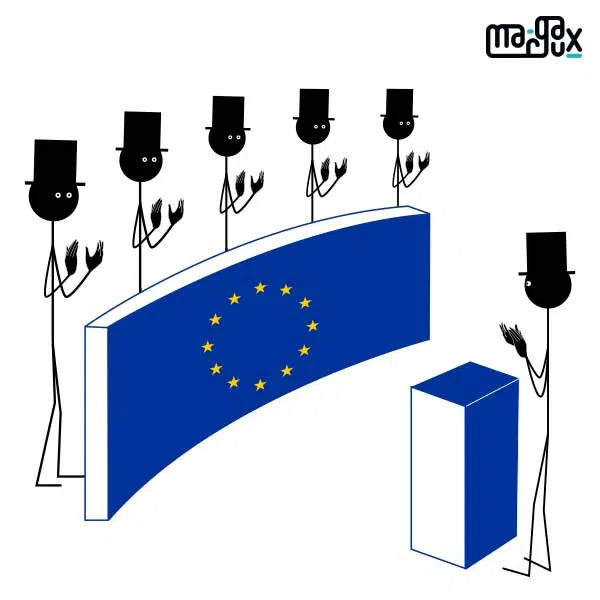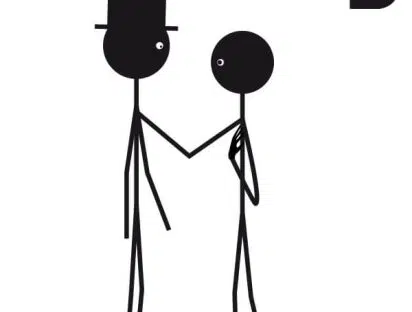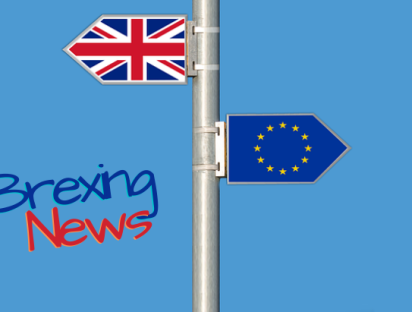Ukrainian President Volodymyr Zelenskyy received a standing ovation during his visit to the European Parliament on 9 February 2023. Beyond the content, the emotion he clearly felt at the beginning of his speech was underlined by the media. It was only after a brief exchange of applause that he was able to begin. But behind its conventional and stereotypical appearance, this applause had, one can assume, a genuine moral value.

Before giving the reasons for this, it is useful to look at the facts.
Volodymyr Zelenskyy was given a standing ovation by the parliamentarians as he entered the European Parliament. Its President, Roberta Metsola, gave an introductory speech and then, before handing over to her guest, exclaimed in Ukrainian: “Glory to Ukraine” (Slava Ukraini) (1).
Volodymyr Zelenskyy, who was seated on her right, then came to the podium to applause. His first words echoed the exclamation “Glory to Ukraine” with which Roberta Metsola had ended her speech. He then paused for a moment, the cause of which was attributed to emotion (2), during which he applauded in turn, eliciting further applause from the hall. Finally he began his speech.
There are different interpretations of this last sequence of applause. So-called “conversationalist” analyses of politicians’ speeches suggest that it is equivalent to the sequence of turns that occur in a conversation between two or more people (3). Researchers in this stream have shown that these turns of speech can be triggered by mechanisms that allow those listening to a speaker to intervene in the conversation at an appropriate moment.
Following this idea, conversationalists have identified rhetorical devices that a speaker can use to elicit applause from his or her audience – and to maintain their attention. In other words, the manifestations of this audience, whose members in this context are passive (this would not be the case in a classroom, for example), can be elicited not only by the content of the speaker’s discourse, but also by the way in which this discourse is constructed.
Among the mechanisms identified by conversationalists are the list of three, antitheses or contrastive pairs, giving the solution to a puzzle (puzzle-solution) or ending a sentence with a punchline (punchline) (4).
For example, applause can be elicited by a list of three items, of which this sentence from Margaret Thatcher’s 1980 meeting is an example:
“This week has demonstrated that we are a party united in purpose, strategy and resolve.” (5)
The audience expects, after hearing the conjunction “and,” that a third and final element (here “resolve”) will come into the speech to constitute the point of completion of the sequence, which may as such, lead them to applaud (which was the case in the example presented).
It is worth noting that Roberta Metsola’s introductory speech elicited several sequences of applause, one of which may have been aided by the combination of a list of three (“When a devastating earthquake hit Turkey and Syria, you stood up and sent rescuers, equipment and expertise”) and a punchline (“That is real solidarity”).
This kind of process helps to explain the remarkable coordination of the audience when it applauds a speaker in unison. It is remarkable because each member of the audience applauds spontaneously, without contagion or imitation, let alone deliberation (6).
The speaker can elicit applause from the audience in a more direct way. This is what happened in our case: after saying “Glory to Ukraine,” the Ukrainian president applauded instead of starting his speech, eliciting a round of applause from the parliamentarians. The latter can be interpreted as an encouragement to continue speaking, showing an empathetic understanding of the speaker’s psychological state. But it can also be hypothesised that these rounds of applause expressed the mutual gratitude between Volodymyr Zelenskyy (or the Ukrainian people) and the European Union. On the one hand, Ukraine defends European values (hence the gratitude of the EU), on the other hand, the EU supports it (hence the gratitude of Ukraine).
Gratitude is a moral notion. This is why, presumably, it gives a moral value to the applause that was exchanged during Volodymyr Zelenskyy’s visit to the European Parliament, especially during the sequence we have just mentioned.
Gratitude here is seen as a moral duty or moral virtue. We can limit ourselves to the idea that it is a moral emotion (which does not exclude it being a duty or a virtue). For the psychologist Jonathan Haidt, gratitude is an “important moral emotion” that is “triggered by the perception that another person has done a good deed for the self, intentionally and voluntarily” (7). This emotion is not only experienced – the person experiencing “feelings of goodwill,” according to the philosopher Tony Manela –: it is also the source of dispositions to act (8). The actions in question are not limited to expressing thanks: they invite us to reciprocate, for example, by helping the person who has given us a benefit, to avoid causing harm to them and even to defend their interests (9).
In short, gratitude promotes reciprocity, strengthens the bonds between people and contributes to their present and future cooperation. In this way, it has a moral value, and since (according to our hypothesis) the applause we are talking about expressed gratitude, it in turn acquired a moral value.
References
(1) “President Metsola welcomes Ukraine’s President Volodymyr Zelenskyyy,” Press Releases, 9 February 2023.
(2) He was “moved to tears as he spoke” (“Zelenskyy à Bruxelles : les images fortes du président ukrainien, très ému, devant le Parlement,” tf1info.fr, 9 February 2023).
(3) See J. M. Atkinson, Our masters’ voices, Methuen, 1984, and J. Heritage & D. Greatbatch, “Generating applause: A study of rhetoric and response at party political conferences,” American Journal of Sociology, 92(1), 1986, pp. 110-157.
(4) The rhetorical devices quoted are from J. M. Atkinson, op. cit., and J. Heritage & D. Greatbatch, op. cit.
(5) From J. M. Atkinson, op. cit.
(6) This passage comes from my practical philosophy column, broadcast on euradio on 19 February 2023: “La gratitude dans les échanges d’applaudissements entre Volodymyr Zelenskyy et le Parlement européen.” On the problem of audience coordination, see S. E. Clayman, “Booing: The anatomy of a disaffiliative response,” American Sociological Review, 58, 1993, pp. 110-130. Relieu and Brock note that it is “almost impossible [for an audience member] to rely on imitating the behaviour of others after observation without losing the opportunity to applaud during a pause by the public speaker” (op. cit.).
(7) J. Haidt, “The moral emotions,” in R. J. Davidson, K. R. Scherer & H. H. Goldsmith (eds.), Handbook of affective sciences, Oxford University Press, 2003.
(8) T. Manela, “Gratitude to nature,” Environmental Values, 27(6), 2018, pp. 623-644.
(9) These elements come from T. Manela, op. cit. and the remark about the defence of interests comes from D. M. T. Fessler & K. J. Haley, “The strategy of affect: Emotions in human cooperation,” in P. Hammerstein (ed.), Genetic and Cultural Evolution of Cooperation, MIT Press, 2003.
How to cite this article: A. Anquetil, “The moral value of applause during Volodymyr Zelenskyy’s visit to the European Parliament”, Philosophy & Business Ethics – Alain Anquetil’s Blog, 17 February 2023.




